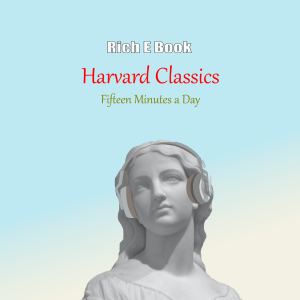
279.5K
Downloads
736
Episodes
Former President of Harvard University Charles W. Eliot wrote in his introduction to the Harvard Classics, "In my opinion, a five-foot shelf would hold books enough to give a liberal education to any one who would read them with devotion, even if he could spare but fifteen minutes a day for reading." Here you are, you can easily listen to his entire 15-minutes-a-day study guide while commuting to and from work (most of us spend far more than 15 minutes a day commuting each day), doing mundane work in the office, washing dishes at home, or doing most of the things day in and day out. It is so easy, so entertaining, and so educational that they can be listened to again and again, until they permeate into our own thinking and into our characters. Perhaps, in one year's time, you will become someone you barely recognize, all for the better. Who knows?
-- Rich E Book
Former President of Harvard University Charles W. Eliot wrote in his introduction to the Harvard Classics, "In my opinion, a five-foot shelf would hold books enough to give a liberal education to any one who would read them with devotion, even if he could spare but fifteen minutes a day for reading." Here you are, you can easily listen to his entire 15-minutes-a-day study guide while commuting to and from work (most of us spend far more than 15 minutes a day commuting each day), doing mundane work in the office, washing dishes at home, or doing most of the things day in and day out. It is so easy, so entertaining, and so educational that they can be listened to again and again, until they permeate into our own thinking and into our characters. Perhaps, in one year's time, you will become someone you barely recognize, all for the better. Who knows?
-- Rich E Book
Episodes

Saturday Oct 02, 2021
Introductory Note: Charles Darwin (#2)
Saturday Oct 02, 2021
Saturday Oct 02, 2021
Introductory note on Charles Darwin (#2) (Volume 29, Harvard Classics)

Saturday Oct 02, 2021
The Voyage of the Beagle (Ch. V), by Charles Darwin
Saturday Oct 02, 2021
Saturday Oct 02, 2021
Just before Darwin visited Bahia Blanca, an Indian insurrection had been ruthlessly put down. A veteran of the Indian war told Darwin how Indians had been treated. (Volume 29, Harvard Classics)
Darwin returns from South America, Oct. 2, 1836.

Friday Oct 01, 2021
Introductory Note: Niccolo Machiavelli
Friday Oct 01, 2021
Friday Oct 01, 2021
Introductory note on Niccolo Machiavelli (Volume 36, Harvard Classics)

Friday Oct 01, 2021
The Prince (Ch. 10-12), by Niccolo Machiavelli
Friday Oct 01, 2021
Friday Oct 01, 2021
To-day the chief duty of a prince is to be the nation's friend maker. Years ago princes desired supreme power and, by fair means or foul, strove for control. Machiavelli was a guide for such ambitious princes. (Volume 36, Harvard Classics)
Machiavelli's model prince sent to France as papal legate, Oct. 1, 1498.

Thursday Sep 30, 2021
Introductory Note: Ralph Waldo Emerson
Thursday Sep 30, 2021
Thursday Sep 30, 2021
Introductory note on Ralph Waldo Emerson (Volume 5, Harvard Classics)

Thursday Sep 30, 2021
Manners, by Ralph Waldo Emerson
Thursday Sep 30, 2021
Thursday Sep 30, 2021
An etiquette book and a good tailor do not always produce a gentleman - neither does the Social Register include only gentlemen. Emerson by quaint stories tells how fashion and manners combine to make that rare product -- a gentleman. (Volume 5, Harvard Classics)
Emerson's first marriage, Sept. 30, 1829.

Wednesday Sep 29, 2021
Introductory Note: Confucius
Wednesday Sep 29, 2021
Wednesday Sep 29, 2021
Introductory note on Confucius (Volume 44, Harvard Classics)

Wednesday Sep 29, 2021
The Sayings of Confucius, by Confucius
Wednesday Sep 29, 2021
Wednesday Sep 29, 2021
Confucius was a Chinese magistrate in 500 B. C. He lost the favor of the Emperor and wandered from city to city, teaching and giving counsel. After his death, Emperor and people alike bowed before his shrine. (Volume 44, Harvard Classics)

Tuesday Sep 28, 2021
Introductory Note: Louis Pasteur
Tuesday Sep 28, 2021
Tuesday Sep 28, 2021
Introductory note on Louis Pasteur (Volume 38, Harvard Classics)

Tuesday Sep 28, 2021
The Germ Theory and Its Applications to Medicine and Surgery, by Louis Pasteur
Tuesday Sep 28, 2021
Tuesday Sep 28, 2021
Proof that germs cause many contagious diseases was established by Louis Pasteur. His discoveries revolutionized modern science and lessened the ravages of every type of disease. (Volume 38, Harvard Classics)
Louis Pasteur died Sept. 28, 1895.
